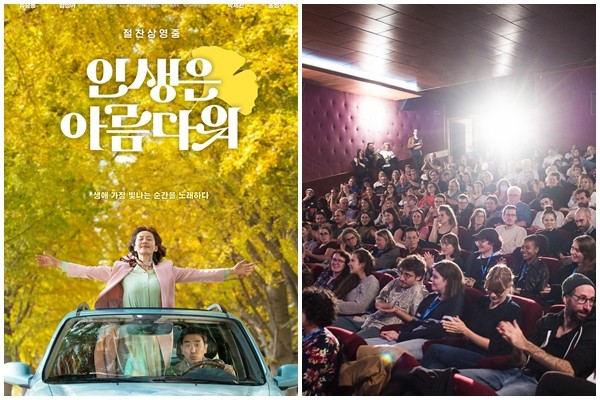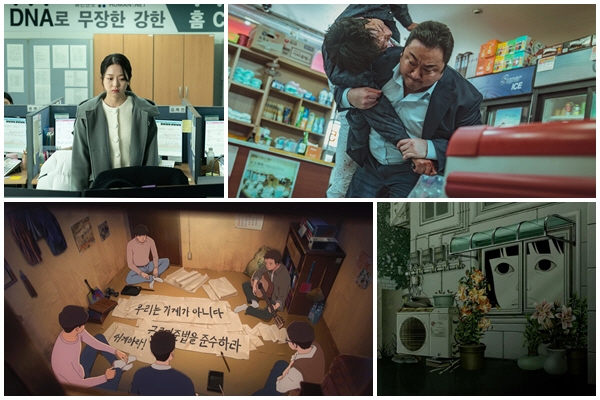130, Suyeonggangbyeon-daero,
Haeundae-gu, Busan, Republic of Korea,
48058
NEWS & REPORTS
Three Years Into COVID-19, How are Teenagers Watching Movies?
- Writerby by Kim Seonghoon, Bae Dongmi, Nam Sunwoo, in coll. with CJ CGV
- View2210
Report on Movie Viewing Habits of Teenagers in the COVID-19 Endemic Era, conducted by web magazine Korean Cinema and CJ CGV based on a survey of 412 teenagers

For the new year, web magazine Korean Cinema took a look into the hearts of the new generation of movie-goers. With this survey, we tried to determine how the COVID-19 pandemic affected the movie consumption habits of teenagers. A total of 10 questions were asked to people aged 10 to 19, covering a variety of topics such as their preferred mediums of movie consumption, the type of cinemas they tend to visit, as well as their favorite streaming platforms, film genres and running times. These findings are worth paying attention to as they provide valuable clues on the way the first generation born in the digital era perceive differently movie theaters and streaming services, while also giving us renewed hope as to the survival of films as medium. Conducted by web magazine Korean Film and cinema chain CJ CGV between November 30 and December 13, 2022 on a sample made of 412 members of CGV’s dedicated app aged 10 to 19, this survey is the first to target this group since social distancing regulations were lifted and we moved into the endemic phase of the virus.
How do you usually watch movies?

Theaters remain as strong as ever. Respondents could pick multiple answers, and they predominantly chose cinemas (95.4%) as one of their preferred ways to watch movies. The figure is considerably high, even when you take into account that this survey was conducted through a mobile app operated by a cinema chain. OTT services take second place with 47,1%. In April 2020, the results of a similar survey published by movie weekly <Cine21> showed that only 20% of teenagers would regularly watch movies on Netflix, Watcha, or Wave, indicating that this share has more than doubled over the past two and a half years. This change seems to coincide with the explosion of domestic OTT platforms subscribers during the pandemic.
It is also worth noting that more than twice as many respondents chose YouTube as traditional supplementary rights channels such as VOD and IPTV. YouTube has a pay-per-view movie section, of course, but it is also the platform many use nowadays to watch so-called “fast movies”, videos created by YouTubers that provide a summary a film and its review in 10 minutes or less. Of course, it would difficult to make a guess as to how many of the 24.5% of teenagers who stated that they “watch” movies on YouTube were actually thinking of these Fast Movies. However, if you look at the large gap between YouTube users and those of other pay-per-view modes like IPTV and VOD, it would be difficult to rule out a potential impact of these summarized movies.
Which OTT services do you like to use?

As for the OTT platform favored by teenagers, the survey shows a marked preference for Netflix. With 84% of respondents that chose the streaming giant among their favorite, Netflix is way ahead of the competition with 50 points more than the next best platform. This is all the more surprising if we take into account the fact that respondents were once again allowed to pick multiple answers. In second place is TVING, which has grown in size thanks to its merger with Seezn last year, and in third comes Disney+, which just celebrated the first anniversary of its Korean launch last December.
It is also worth pointing that the preference between TVING and Disney+ for the second place is shown to differ between male and female respondents. TVING garnered nearly twice as many votes from women (35.5%) as men (17.6%). This is probably a result to relate with TV shows such as <Transit Love>, <Yumi's Cells> and <Work Later, Drink Now> which had a high level of awareness among female viewers and were the main driving forces behind TVING’s subscriber growth. Meanwhile, as Disney+ mainly tapped onto fans of franchises like the Marvel Cinematic Universe (MCU), it quickly gained popularity among teenage audiences in its first year of operation in Korea. Watcha, Waave, Coupang Play, and Apple TV+ all come next, while 13.3% of respondents expressed no preference.
How often do you go to the cinema in a month?

According to the Korean Film Council, the cumulative yearly box office sales as of November 2022 reached 1.26 trillion won, making it the first year since Covid-19 that the total annual income is in excess of KRW 1 trillion. Meanwhile, total admissions over that same period still represented only 48.3% of the level it reached in 2019 at this point into the year. The frequency to which teenage spectators go to the cinema can suggest how much this group contributed to the industry’s recovery. With no significant difference between men and women this time, 30.1% answered that they go to the theater about once a month. Coming a close second are those who go to the movies twice a month, with 29.6%. 18% of the teenagers said that they usually visit cinemas more than 4 times a month, which means more than once a week on average. Only 1.7% said that they don’t even go to the cinema once a month.
Who do you usually go to the cinema with?

Who are the companions teenagers usually choose when going to the cinema? Family members, friends, or maybe they even indulge in ‘hon-yeong’, i.e. solo movie-going? When asked who usually joins them when they watch a movie, the most common answer was, by far, their friends (49.8%). The results are similar across genders, with 48.2% of male respondents and 50.2% of female respondents picking this answer. If not their friends, their next favorite company is neither family members nor partners, but themselves! Respondents who answered that they prefer to watch movies alone accounted for 29.1% of the total. When considering the gender, 30.6% of female teenagers appear to recognize themselves in that solo-watching trend, a share that is somewhat higher than male teenagers (23.5%). Ranking third and fourth are family members with 11.2% and partner with 10%.
What is your most important criteria when choosing a cinema?

The driving factor when it comes to choose a cinema appears to be its distance. 47.6% of the respondents said that they choose a cinema based on its geographical proximity to their home. Many teenage spectators follow their own personal taste, independently of any pragmatic consideration such as distance. 24.5% of the respondents stated that they visit specific theaters due to some personal preference. As shown in the previous graph, about half of surveyed teenagers go to the cinema with friends, so it is only natural that choosing a convenient location for them to meet is seen as particularly important to them. Respondents who indicated that this is the driving factor in their choice of a cinema account for 10%. 9.5% of the respondents acknowledged that their choice depends on discounts at specific theaters, while 4.9% of them first take into consideration the amenities built around the theater, such as restaurants and commercial areas. Finally, 3.6% of respondents mentioned cinema snacks such as popcorn and hot dogs.
What is the most important aspect you consider when choosing a movie to watch in theater?

If you thought that teenagers were swayed by movie YouTubers or ratings, you would be mistaken. The most important factor that teenagers consider when choosing a movie to watch at the cinema is the genre of the movie. 35% of the people surveyed stated that these conventions codified over decades of filmmaking remain the most important aspect they take into consideration. This is true of all teenage audiences, regardless of gender, with 35.3% of male respondents against 34.9% of female respondents. Actors were the second-most cited element (30.8%), and coming in third was the audience’s ratings such as the Golden Egg score on CGV’s app and website (22.6%). Film critics reviews (5.3%) and personal recommendations from acquaintances (3.4%) came next. Who is directing the movie appears to matter relatively less for teenage audiences. Only 2.9% of them said that they base their decision based on the director.
What is the film genre you prefer to watch on the big screen?

The findings are also confirming our expectations that there is now a stronger delimitation between movies made to watch in theaters and those that aren’t, as the industry has shifted its structure and reorganized itself around OTT services due to the prolonged Covid-19 pandemic. The genre the 412 teenagers we polled prefer to watch when they go to the cinema action (33.3%). Both male (38.8%) and female (31.8%) respondents seem to consider that action films with their eye-catching images, spectacular action scenes and high budgets should be seen on the big screen. It is followed by romance & rom-coms (16.3%), crime & thrillers (14.6%), and animation (11.2%). Conversely, it appears that they don’t see comedy (6.6%), drama (5.3%), and horror (2.7%) as genres that would compel them to watch a film at a theater.
What is the film genre you prefer to watch through an OTT service?

On the other hand, romance & romcom (21.1%) and action (20.9%) are the two genres teenage audiences prefer when watching movies on OTT platforms. Looking closely at the different results by gender, it is interesting to note that female respondents (23.2%) are almost twice as likely to watch a romance/rom-com as male respondents (12.9%), whereas the latter (36.5%) are more than twice as likely as the former (16.8%) to watch an action film. These genres are followed by animation (15.3%), crime/thriller (13.8%), and drama (10.7%). All three genres are more appreciated by female viewers more than their male counterparts.
What is for you the ideal running time for a theatrical screening?

It is not easy for teenagers now accustomed to short-form videos to watch a movie for about two hours in a cinema hall. Many filmmakers were worried that the reason teenagers often look at their phones during screenings is that they are not used to watching movies for long periods of time. In fact, when asked what the ideal running time is when they go watch a movie at a theater, most respondents said that it doesn't matter. (46.4%). More specifically, we can observe that female teenagers (49.5%) are significantly less affected by the running time than male teenagers (34.1%). For those to whom it does matter, the ideal running time is between 90 and 120 minutes (36.9%). 14.8% of the respondents said they are able to handle more than 120 minutes, while a surprisingly small 1.9% of teenagers shared that they prefer movies under 90 minutes of running time. It appears that the running time doesn't matter that much as long as the movie is entertaining enough, contrary to the widespread idea that millennials and members of Generation Z, especially teenagers, wouldn’t have the patience to watch a movie at a cinema.
How do you stay informed about movies?

Cinema chain-affiliated apps were found to be the most used means by which teenage spectators (27.7%) acquire information about movies. In other words, they decide whether or not to watch a movie by looking at the spectators reviews and ratings on the chain’s dedicated app. As a YouTube generation, there were not a few people who said that they chose movies (23.8%) based on recommendations on YouTube's movie-related channels. Among social medias, Instagram (20.9%) was the most popular, followed by Twitter (12.1%) and Facebook (2.7%).




















